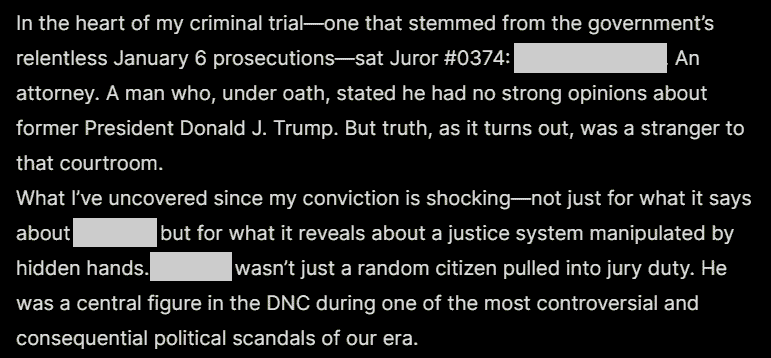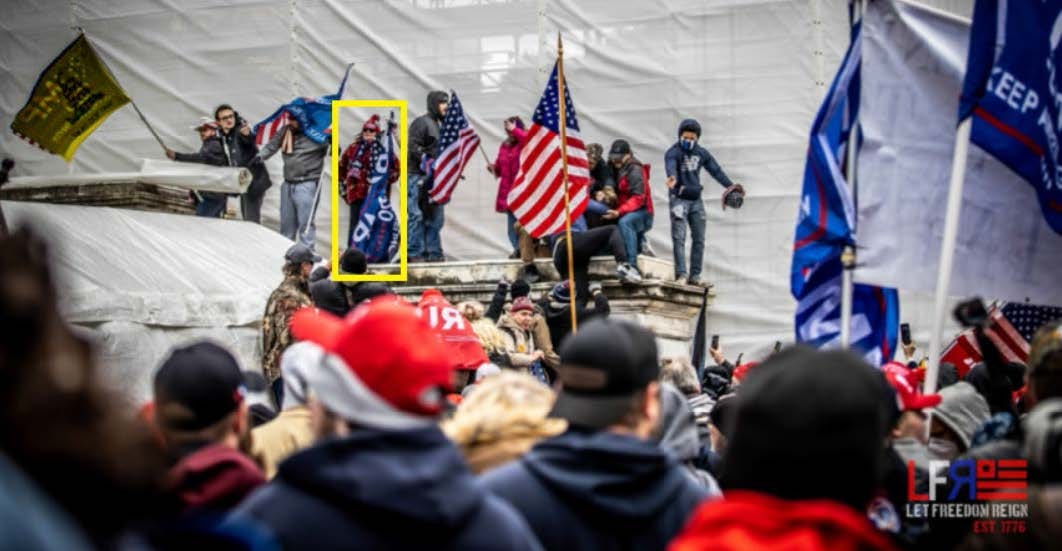Naming names: New Hampshire J6er back in court with allegation of jury misconduct
Bristol, N.H., grandmother Cindy Young is reviving debunked conspiracy theories as she seeks to have her conviction overturned.
The Bristol, N.H., grandmother, who was convicted—and later pardoned—for her role in the January 6 attack on the U.S. Capitol, made the rounds on the J6er podcast circuit last month with an explosive allegation: that the jury foreperson in her case violated her Sixth Amendment right to an impartial jury, failing to disclose an “extensive political past, clear ideological bias, and active participation in anti-Trump, pro-Clinton operations.”
Cindy Young documented her allegations in an essay she shared on social media titled “The Juror Who Should Never Have Been: [name redacted] and the Hidden Hand Behind the DNC Email Scandal.” In it, she alluded to being targeted by shadowy forces, writing, “What I’ve uncovered since my conviction is shocking—not just for what it says about [name redacted], but for what it reveals about a justice system manipulated by hidden hands.”
Young claims the jury foreperson is a former Democratic National Committee staffer who was at the center of the 2016 DNC cyber attack. She accuses the juror of having “ties to spreading disinformation on Russiagate” and other conspiracy theories stemming from the breach.
In her telling of the DNC email hack, Young advances a novel theory that conflates two separate conspiracy theories: the murder of Seth Rich, a DNC staffer whose death in an unsolved robbery was falsely linked by conspiracy theorists to Hillary Clinton, and Guccifer 2.0, the hacker persona created by Russian intelligence to divert blame from Moscow.
(I can personally debunk that theory, having exchanged messages with Guccifer 2.0 weeks after Seth Rich died, for a story about a New Hampshire congressional race.)

Convicted and sentenced
On August 9, 2024, Young was convicted of four misdemeanors for breaching the Capitol and was subsequently sentenced to serve four months in federal prison. Unrepentant, she then wrote, “I have been found guilty on all 4 counts for not confessing my sins to the Biden Regime.”
At the end of her trial, Young’s attorney filed a motion for a new trial based, in part, on a claim that the juror she now accuses of misconduct answered questions dishonestly in the Court’s voir dire, that the juror “failed to acknowledge any strong feelings about former President Trump, his followers, election deniers, or January 6 that would interfere with judging Defendant fairly and impartially.”
U.S. Magistrate Judge G. Michael Harvey denied the motion, noting the Court “did not find any suggestion” that the juror was “anything but truthful and straightforward.”
The day before she was scheduled to report to the Bureau of Prisons to begin serving her sentence, Young received a full pardon from Donald Trump, one of the nearly 1600 pardons he issued for those involved in the attack on the Capitol.
Seeking to have her conviction overturned
Young complained that the pardon did not erase her conviction, nor the stigma associated with it. She returned to court at the end of July, now representing herself, and asked permission to file motions seeking to unseal the name of the jury foreperson and to vacate her conviction due to juror misconduct, a violation of the Sixth Amendment right to an impartial jury.
In response, Judge Harvey apparently reviewed Young’s podcast and Twitter feed and then reminded Young that the court’s Local Criminal Rules and Judicial Council of the United States policy require parties to maintain jurors’ confidentiality. He ordered Young to keep the juror’s identity confidential and to have no communication with that individual, except in the presence of the Court.
Young appears to have deleted her social media posts naming the juror, although her podcast interviews and a copy of her essay—which do identify the individual—remain publicly accessible.
Young countered the judge’s order by filing a motion for reconsideration, now noting that she understands and respects the need to protect juror-identifying information, but challenging orders that she described as “attempts to retroactively block my speech and shield juror misconduct from scrutiny.”
The pro se defendant has filed a slew of motions in the last three weeks, and Judge Harvey is moving through them quickly. The government's response to her motion asking the Court to overturn her conviction is due by the end of the day today.




